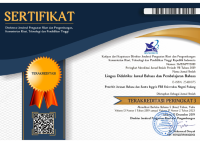GAYA BAHASA MAHASISWA DALAM MEMINTA IZIN MELALUI SMS DAN RESPON DOSEN
 ),
), (1) Jurusan Pendidikan Bahasa Inggris FKIP Universitas Mahaputra Muhammad Yamin Solok
 Corresponding Author
Corresponding Author
Copyright (c) 2016 Lingua Didaktika
DOI : https://doi.org/10.24036/ld.v9i1.6259
Full Text:
 Language : id
Language : id
Abstract
One effect of the development communication and technology is infinite space and time in doing communication. In the past, written communication was done by using letter, but nowadays communication can be done quickly, easily and cost-effective one. It could be done by using SMS (Short Massage Service). However, it shows the reality of the absence of a clear convention about how to write SMS text creating a style of language, especially among English students of UMMY Solok. Based on the observations and interviews, the writer found that the number of lectureres complained about the contents of SMS text messages sent by students primarily in asking permission to lecturers. This coupled with the increasingly widespread slang languange often used by students. This indicates that the language used in students’ SMS requested permission from the lecturers are still having problems. The aim of this study was to analyze the style of language used in SMS while student requested permission from lecturers and in order to find out lecturers’ respond to the SMS. This research is a descriptive study that takes data from SMS text English department students that have been collected during one semester semester 2014/2015. Data were also obtained based on the interview to the English language lecturer. This study is expected to be the basis of empirical how ethical language student asked permission in the use of SMS medium to lecturers and also gives contribution to the development of instructional media, especially in English corespondence subject for English Department.
Keywords: Language style, SMS, English Student.
Keywords
References
Aminuddin. 1995. Stilistika, Pengantar Memahami Bahasa dalam Karya Sastra. Semarang: IKIP Semarang Press
Ardi, Havid. 2013. Etika Berkomunikasi dengan Dosen. English Department of FBS Universitas Negeri Padang. Diunduh dari http://english.unp.ac.id pada Febru-ari 2014.
Arikunto, Suharsimi. 2009. Dasar-dasar Evaluasi Pendidikan. Jakarta: PT Bumi Akarasa.
Arikunto, Suharsimi. 2010. Prosedur Pe-nelitian Suatu Pendekatan Praktik. Jakarta: Rineka Cipta.
Babbie, Earl. 2006. “Content Analysis.” Wikipedia, the Free Encyclopedia. (http://en.Wikipedia.org/wiki/Content analysis) , retrieved on February 2014).
Effendy, Akip. 2012. Hakikat keterampi-lan menulis.Jakarta
Hussin, Supyan. 2009. Bahasa SMS Pe-nyeri Landskap pada abad ke 21. (http://supyanhussin.wordpress.com/2009/07/11/bahasa-sms/ Re-trieved on 5 April2014.
Morelent, Yetty. 2009. Bahasa SMS Dari Segi Grafologis, Sintaksis, dan Psikolinguistik. Artikel dalam Pro-siding Kolita 7, hal 269-272. Jakar-ta: Pusat Kajian Bahasa dan Bu-daya Unika Atmajaya Jakarta
 Article Metrics
Article Metrics
 Abstract Views : 747 times
Abstract Views : 747 times
 PDF Downloaded : 178 times
PDF Downloaded : 178 times
Refbacks
- There are currently no refbacks.
Copyright (c) 2016 Lingua Didaktika









